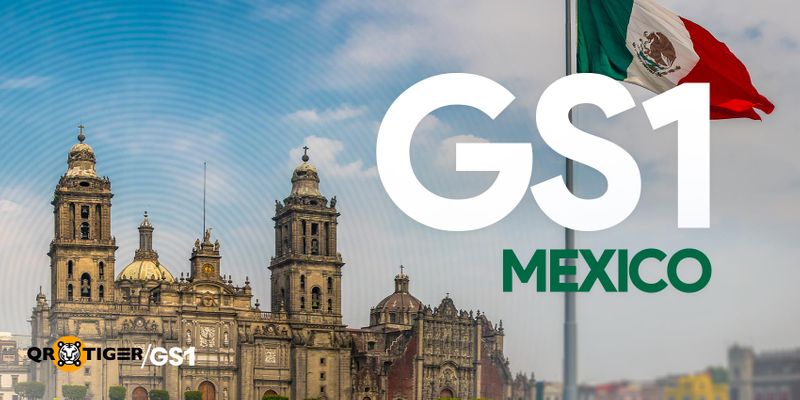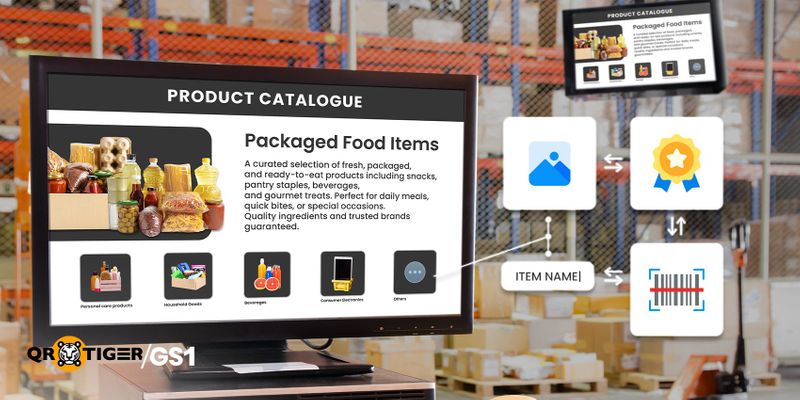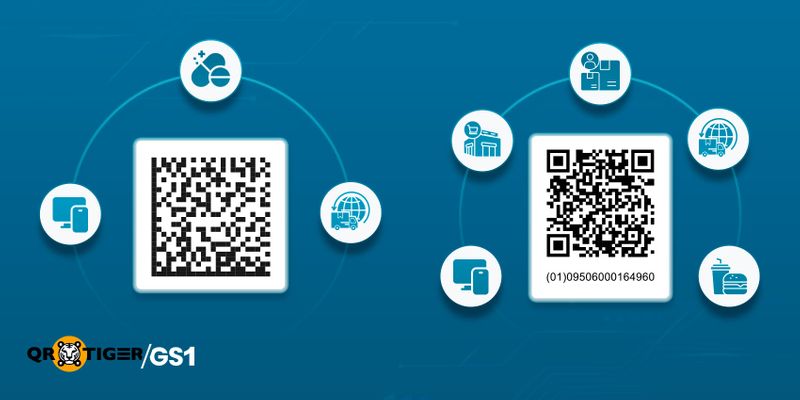GS1 Mexico: Powering Traceable, Transparent Supply Chains

Traceability and transparency have become essential in today’s fast-evolving trade and logistics environment. Industries across Mexico are turning to GS1 standards to better manage complex supply chains. From retail to hospitals, the standards help drive smooth operations and smarter data use.
By enhancing traceability, inventory management, and automation, these standardized solutions help various industries optimize their operations. Let’s explore how GS1 standards are transforming industry practices in Mexico and empowering a more traceable, transparent future.
Table of Contents
What is GS1 Mexico?
GS1 Mexico (MX) is a member organization (MO), of the GS1 international organization, neutral and non-profit, founded through collaboration between retailers, manufacturers, and supply chain stakeholders to facilitate and automate sharing between partners depending on a unique identification system.
GS1 MX has helped businesses identify and label their products for over 30 years. It issues globally unique barcodes to companies registering with GS1, enabling consistent product identification and easier data exchange across supply chains.
Its mission is to implement globally recognized GS1 standards and best practices to strengthen its associates' value chains through neutrality and collaboration. It promotes efficiency, visibility, security, and cooperation across supply chains. It involves industries in adopting data standards and brings together stakeholders to solve shared challenges.
By creating a common information base, the local GS1 chapter helps businesses grow and improve their efficiency, security, and sustainability.
The member organization also provides training and guidance to help SMEs adopt suitable technologies and optimize storage usage.
Address: Boulevard Toluca No. 46, Col. El Conde, 53500, Estado de México, Mexico
Contact no: + 52 55 5249-5200
Email: info@gs1mexico.org
Collaborated campaign
GS1 MX works with organizations and businesses to improve industry transparency, product tracking, and supply chains. Through different programs and partnerships, it helps companies adopt global standards and smart solutions for better efficiency.
Strategic Partnership with bops.ai
GS1 Mexico partnered with bops.ai to solve a major retail problem—products being out of stock or overstocked. These issues lead to frustrated customers and financial losses for stores.
To resolve this, bops.ai created an Inventory Intelligence Platform that uses real-time data and AI to help businesses predict demand and manage inventory more accurately. By adding this platform to GS1 MX’s system, the partnership helps businesses decide what to stock, where to place it, and when.
The partnership was launched at Expo ANTAD 2024, Mexico’s biggest retail and consumer goods event. It indicates a shift toward a smarter, more connected supply chain where data provides valuable insights.
With GS1’s global standards and bops.ai’s technology, companies can improve product availability, cut waste, and increase profits—while giving customers better access to the products they need.
Solutions for GS1 MX members
GS1 MX members provide the following solutions to its members to support the retail industry.
Barcode: GS1 MX provides barcodes that meet the standards of major self-service chains, e-commerce platforms, and retailers in Mexico. These include GS1 barcodes, DataBar, linear codes, 2D codes, and ISBN codes.

Syncfonía+ is GS1 MX’s digital catalog that helps standardize and centralize product data for digital platforms and retailers.
It allows manufacturers and distributors to share verified product details, like descriptions, images, and certifications, using global GS1 standards. This improves brand consistency and helps fulfill retail requirements across physical and online stores.
Zero Shortage: The local chapter’s Desabasto Cero (Zero Shortage) initiative uses AI and real-time analytics to decrease product stockouts.
It detects issues like delayed orders or inventory mismatches and gives retailers and suppliers the insights they need to act quickly, keeping shelves stocked and reducing lost sales.
Infocode: GS1 MX’s Infocode platform connects brands and consumers through barcode scans. It lets companies publish clear, detailed product info,like ingredients, allergens, origin, and product sustainability data,via an app or website.
It also supports videos, recipes, and promotions connected to products, helping build trust and customer engagement in both digital and physical retail.
By helping brands share real-time updates and personalized content, GS1 MX positions Infocode as an essential tool in the evolution of omnichannel retail.
GS1 EDI: The GS1 local chapter supports Electronic Data Interchange (EDI) to automate document sharing—like orders, invoices, and shipping notices between partners.
EDI follows global GS1 standards, ensuring efficient, scalable, and error-free communication across industries and supply chains. It enhances traceability, efficiency, and cooperation between businesses of all sizes.
Applications of 2D barcodes across industries in Mexico

GS1 is leading the shift to 2D barcodes like QR codes and GS1 DataMatrix to upgrade operations across industries. These advanced barcodes store more data than traditional 1D codes and support better tracking and transparency.
This move supports the global GS1 Sunrise 2027 initiative, which calls for all retail point of sale (POS) systems to be capable of scanning 2D barcodes by 2027.
This does not mean that 1D barcodes will be phased out. Businesses can continue using 1D codes if they prefer, as long as regulations do not require a shift to 2D.
During the transition period, it is advised to include both 1D and 2D barcodes on the packaging. This ensures compatibility with retailers whose systems are not yet ready to read 2D codes.
Companies can either build their own software for generating GS1 2D barcodes (by adhering to GS1’s implementation guidance) or use a third-party service like GS1 QR code generator by QR Tiger to encode product data using GS1 formats.
Retail
Retailers in Mexico are slowly adopting 2D barcodes at the point of sale to improve inventory accuracy, real-time product traceability, and consumer experience.
With a single scan, shoppers can access key product details like ingredients, allergens, expiration dates, and recycling instructions, enhancing transparency and building brand trust.
GS1 MX supports this shift by promoting the use of 2D barcodes and offering guidance to retailers exploring new digital experiences, including loyalty integration and mobile-based product interaction.
The GS1 standards define how a barcode tracking system can be structured using globally recognized identifiers, enabling accurate product monitoring, secure recordkeeping, and reduced errors, leading to an improved customer experience.
Healthcare
Mexico is Latin America’s biggest exporter of medical devices. It is one of the leading global exporters of prosthetics, surgical instruments, and diagnostic equipment. With such a critical role in the global medical supply chain, maintaining safety, precision, and traceability is paramount.
In this context, 2D barcodes have become an essential tool in the healthcare sector. They are used to track medications, medical devices, and patient records with high accuracy.
Their ability to store more data in a compact format reduces errors, supports safer dispensing, and improves traceability across the supply chain.
GS1 MX collaborates with hospitals and pharmaceutical companies to implement 2D barcodes to ensure a transparent digital trail of every product from production to point of care.
Supply chain
2D barcodes help logistics providers in Mexico optimize inventory management, reduce waste, and streamline returns. They enable faster scanning and make supply chains more efficient.
Using a GS1 QR code for detailed product information, consumers can get essential details about product ingredients, origins, and certifications. These codes keep all stakeholders (suppliers, manufacturers, consumers, etc.) updated about detailed product information and thus ensure supply chain transparency.
With GS1 México’s guidance, companies are digitizing tasks like tracking product expiry information and real-time stock updates to decrease shrinkage and fulfill market demand.
Transport and logistics
As a supplier, it’s important to know exactly where your shipments are, when they’ll arrive, and which store they’re dispatched to. GS1 standards ensure high data accuracy so you can make smart decisions for your business.
With support from GS1 MX, logistics providers are integrating barcode scanning with GPS and tracking tools. So, they get full visibility of shipments—from start to finish, reducing delays.
Manufacturing
Manufacturers are using 2D barcodes to improve quality control, verify products, and meet regulatory requirements. These barcodes capture real-time data on production lines, reducing errors and improving traceability.
GS1 MX supports adding color and designs to 2D barcodes, and they will still work as long as at least 70% of the code is clearly visible. Before using modified 2D barcodes, it is essential to get each unique barcode verified as per the ISO/IEC 15415 and the applicable symbology standards.
This process ensures the barcode meets the required quality standards and complies with the GS1’s general specification guidelines. So, scans stay reliable while making the design more engaging for consumers.
Factories also use 2D barcodes, like GS1 Digital Link powered QR codes to automate inspection points, scanning batch numbers, expiration dates, and compliance data to boost safety and reduce human error.
Fashion
The GS1 local chapter helps the fashion industry improve warehouse operations, delivery, and inventory systems to fulfill the market demands. This ensures that consumer expectations are fulfilled before, during, and after a purchase.
Fashion brands in Mexico are using GS1-enabled 2D barcodes, including GS1 Digital Link QR code to create digital product passports. With a scan, shoppers can check care instructions, fabric origin, and ethical sourcing details, reinforcing trust and encouraging engagement after the sale.
Success stories from GS1 MX
GS1 Mexico has supported businesses in many industries to improve efficiency, transparency, and product traceability. These success stories indicate how companies have benefited from GS1 standards and innovative solutions to optimize operations.
Liverpool improved its supply chain with EPC/RFID
Liverpool, one of Mexico’s biggest department store chains, worked with GS1 MX to upgrade its supply chain using EPC-enabled RFID (radio frequency identification) technology. As the company opened 5 to 7 new stores each year, it needed to accelerate distribution center operations and boost accuracy.
After a successful pilot, Liverpool started using RFID-tagged plastic cases for warehousing and shipping. This reduced manual errors and allowed real-time tracking.
With GS1’s global standards, Liverpool reached 99.9% accuracy when scanning goods in and out. This helped the company with improved visibility and reduced spending on misdeliveries and extra stock. Also, it accelerated key tasks like receiving, sorting, and shipping.
Brizz Ice scales retail success
Brizz Ice, a Mexican breath freshener brand founded by Gastón Alarcón Rodríguez, noticed a market gap for easy, on-the-go oral care. To launch professionally, the company focused on proper packaging, clear labeling, and meeting regulations.
With help from GS1 MX, Brizz Ice used standardized barcodes to meet retail requirements and simplify product identification. This helped them enter major retail chains and enhance inventory tracking.
Pie Grande expands market reach
Pie Grande, a Mexican company, is known for handcrafted products. Its mission is to make Mexican crafts accessible worldwide.
When exporting and trying to sell products in the U.S., Ernesto, founder of Pie Grande Handcrafts, found that 90% of the stores required barcodes. He learned that printing on his own was illegal and would severely affect sales by not fulfilling global standards.
With assistance from Coordinadora de Fomento al Comercio Exterior (COFOCE), he got proper guidance on obtaining legal barcodes for his handicrafts.
He credited GS1 MX as a vital business partner that helped him get proper guidance on barcode implementation, making Mexican handicrafts reach a global audience.
Why register GS1 MX?
GS1 Mexico helps businesses improve product visibility by standardizing product information, making it easier to sell in both physical and digital markets.
With over 30 years of experience and more than 100,000 barcodes assigned, GS1 MX supports:
- Efficient and reliable logistics, helping prevent product loss and reduce costs.
- Access to major supermarkets, by meeting global standards for product data.
- Customer trust, through traceable, quality information that supports better buying decisions.
Unlock Business Potential with GS1 MX
GS1 Mexico is key in helping businesses nationwide improve how they identify, track, and share information about their products.
As part of the global GS1 system, it provides companies with the tools and standards needed to ensure their products move efficiently through local and international supply chains.
From assigning barcodes to supporting the adoption of 2D codes and digital traceability, GS1 Mexico enables manufacturers, retailers, and service providers to speak the same language, one based on accuracy, transparency, and global interoperability.
DISCLAIMER: We acknowledge that GS1, as well as the materials, proprietary items, and all related patents, copyright, trademark, and other intellectual property (collectively, “intellectual property”) relating to its use, are the property of GS1 Global, and that our use of the same shall be in accordance with the conditions provided by GS1 Global.




